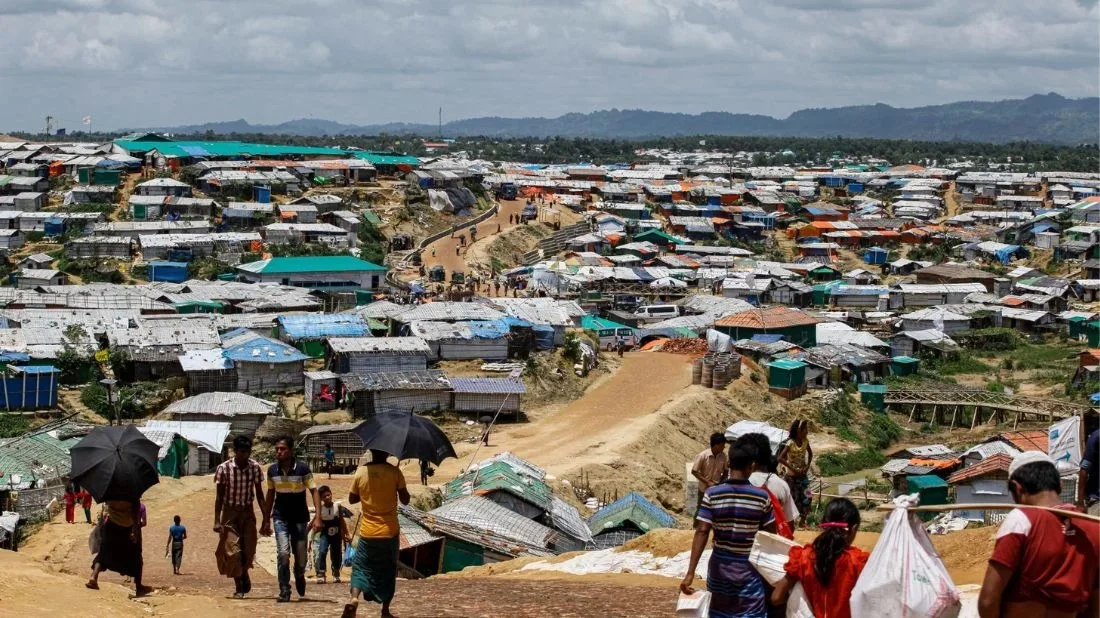Battle for dominance in camps claims 26 Rohingya lives in 6 months
Share on:

Extortion, drug trafficking fuelling Rohingya camp violence
Violence in Cox's Bazar's Ukhiya and Teknaf Rohingya camps continues to escalate, with 26 refugees being killed so far this year.
Advanced firearms, introduced by Rohingya criminals, have led to increased fatalities, causing both Rohingyas and local residents to live in fear and anxiety.
Thursday, June 20, marks World Refugee Day. Bangladesh currently hosts over 1.1 million Rohingya refugees. However, Rohingya leaders said no events had been planned in the Cox's Bazar camps to observe the day.
From January to June 19, 26 Rohingyas, mostly community leaders, were murdered in the camps. Among them, four were volunteers. They had become volunteers primarily for their safety after the murder of Rohingya leader Mohib Ullah in 2021.
According to law enforcement, these murders stem from internal conflicts and battles for dominance.
Rohingya leaders claim that around a dozen armed criminal groups are active in the camps. Of them, members of Myanmar's Arakan Rohingya Salvation Army (Arsa) and Rohingya Solidarity Organization (RSO) often engage in bloody clashes.
Md Amir Zafar, additional deputy inspector general of police and chief of the 8 Armed Police Battalion (APBn), said joint patrols with local police had been intensified to curb crimes, including murders, in the refugee camps. Intelligence surveillance had also increased, and efforts to arrest criminals were ongoing, he added.
Increasing violence
According to police and Rapid Action Battalion (RAB) data, attacks, clashes and gunfights among Rohingya criminal groups over extortion and drug trafficking are on the rise. From the beginning of this year to June 19, 26 Rohingyas, including four community leaders, were killed.
Sixty-four people were murdered last year.
Earlier, from August 25, 2017, to December 31, 2022, there were 132 killings in the Rohingya camps, mostly targeting community leaders who are locally known as “majhi.”
The latest one came on May 14, when Arsa allegedly abducted Mohammad Ilias, 43, the head majhi of a camp in Ukhiya and fatally shot him.
On May 6, Rohingya leader Zafar Ahmad was abducted and killed by assailants in Balukhali camp. Arsa is suspected of being involved in this murder too.
The previous day, RSO member Nur Kamal was found murdered in Balukhali.
Nur Hossain, a leader from the Ukhiya Balukhali Rohingya camp, said criminal activity had surged noticeably in the camps. “Gunfights between Arsa and RSO over dominance are a nightly affair. Ordinary Rohingyas are often caught in the crossfire.”
Reasons for conflict
Several Rohingya leaders said armed group members were spread throughout the camps and had changed their tactics; they no longer roamed openly with weapons but attacked targets at opportune moments.
Mohammad Amin, a leader of the Kutupalong Rohingya camp, said when one armed group took control of an area, another group retaliated to reclaim it.
The resurgence of Arsa-RSO power struggles was leading to increased murders, Amin said, adding that conflicts also arose over sending Rohingyas from the camps to join the ongoing war in Myanmar.
Ukhiya police station Officer-in-Charge Mohammad Shamim said crimes were often hindered by Rohingya leaders and volunteers, which prompted attacks.
Efforts to suppress the resurgence of new factions in the camps were underway, with increased patrols and surveillance, the officer added.
Gafur Uddin Chowdhury, chairman of Palongkhali union parishad in Ukhiya, mentioned that gunfights occurred in the camps over participation in the Myanmar conflict.
Four to five main criminal groups are currently active in the camps, according to him, with significant conflicts over dominance and drug (especially yaba) trade, causing fear among camp residents and locals.
Armed groups also roamed nearby villages at night, resulting in further alarm, Gafur added, demanding the government increase law enforcement patrols in the area.
Muhammad Zubair, acting chairman of the Arakan Rohingya Society for Peace and Human Rights (ARSPH), expressed concern about the deteriorating conditions in the camps, especially for women and children.
The lack of basic amenities and the rising murder rate made daily life in the camps perilous, he said. “Our lives are directionless, with no stability. The living conditions are dire, and murders are increasing daily. We constantly live in fear for our safety."

